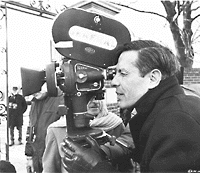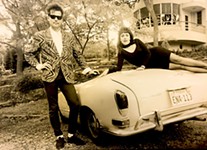On the Edge of the Edge
John Cassavetes
By Michael Ventura, Fri., Jan. 23, 1998
|
|
In the summer of 1983 we were in a screening room off Hollywood Boulevard, watching the dailies of what would be his last film, Love Streams. John Cassavetes was exhausted. He may not have known yet that he was dying, but he surely suspected. His skin was colorless, his face and arms were becoming thinner while his midriff bulged hugely. He was trying to put everything he had into this film, but that was nothing new, he'd always done that. It was just that now the stakes were even higher. As we watched take after take of the same scene, John's neck craned forward, he was mumbling softly to himself - something about how, though the scene was shot as he'd written it, it didn't play as he'd written it. The truth these actors were playing was unexpected - and John and his wife, Gena Rowlands, were the actors! They spoke the lines he'd written, but had come up with something in performance that was even edgier than he'd intended.
John Cassavetes believed in nothing so much as the truth of a truthful performance. The writing was what you thought, but the performance was something more - it was how you lived. "You know as a director what you want," he said, "but the film is smarter than you, the film says no, the film says there's something more here." That "something more" came from what was discovered during performance. Today it meant that he would get no sleep again, he'd be up 'til dawn rewriting the next scenes (he always shot in sequence) to extend what he and Gena had discovered. To a man as ill as he was, the prospect had to be daunting.
When the lights came up, John looked at me with that unrelenting look he had. That look. It was fierce, and it was funny - as though a tough joke had been told, and the joke was on him. It was full of pain, yet full of eagerness. It was the look of a man doing what he was born to do, a man who would settle for nothing less. It was all those things, and it was something more: It was humble. For all his arrogance, his pride, his rages, John Cassavetes was a sweet and humble man, a man who would spend hours - and on a shooting day! - listening to the opinions and stories of grips, script girls, bit players, and the people who dished out the food, because human beings interested John. He was humble before our struggle to live and to make some sense of our lives. This shines in every film he made.
So when the lights came up after those dailies, dailies that would force him to work even harder, he looked at me with that look, smiled a kind of grimly goofy smile, and said, "Well, kid - if it was easy, anyone could do it."
How many times, sitting at this typewriter, wrenched by the distance between what I'm attempting to write and what I'm actually writing, have I remembered John smiling like that? Often he's said to me, from his photo that is always in my writing room: "Kid" - he called many of us "kid" - "if it was easy, anyone could do it."
It had never been easy.
Forty years ago, when Cassavetes was making his first movie (Shadows) nobody talked about "independent films" because there weren't any. The studios not only had a lock on filmmaking, they had codified what the word "film" meant. And what it meant more than anything was: unreality. In most Hollywood films, then and now, the story tells one thing and the performances tell another. The story is a confection, a lie, and everybody knows it. But what Bette Davis, say, is playing - that's not a lie. This tension is part of what makes great Hollywood films fascinating, but it's also what makes them crazy - or makes us crazy. Because we're watching something genuine in the service of something else that is not at all genuine. John wouldn't settle for that.
John Cassavetes was in his late twenties when he started making Shadows, with no money, no rep, no prayer of getting his film seen - there was no "festival circuit" in America in those days - and no critical support. (With two or three exceptions, American critics weren't on John's side until he was safely dead.) But he determined to make films in which story and performance were inseparable. More than this, he would make films that did not hide the basic and inescapable awkwardness of human life. Our scenes don't play smoothly, so why should scenes on the screen play smoothly? We speak often in broken and halting sentences that don't mean much; so that is how John would write dialogue. (In Shadows and Husbands many lines are improvised, though only after much rehearsal; in John's other films, no matter how improvised the dialogue sounds, it is meticulously scripted.) Our stories never end with a definite climax, nothing for us is ever completely decided; so that is how John would treat the concept of "story." Most of what human beings do is talk to each other. That is our lives. So that's what people would do in John's films.
"I've never seen an exploding helicopter, I've never seen anybody go and blow somebody's head off. So why should I make films about them?" John said. "But I have seen people destroy themselves in the smallest way, I've seen people withdraw, I've seen people hide behind political ideas, behind dope, behind the sexual revolution, behind fascism, behind hypocrisy, and I've myself done all these things. In our films [he always spoke of our films, the film the entire crew was making] what we are saying is so gentle. It's gentleness. We have problems, terrible problems, but our problems are human problems."
And he said: "I won't call my work entertainment. It's exploring. It's asking questions of people, constantly. How much do you feel? How much do you know? Are you aware of this? Can you cope with this? A good movie will ask you questions you don't already know the answers to. Why would I want to make a film about something I already understand? People have said that my films are very difficult to watch, that they're experiences you are put through rather than ones you enjoy, and it's true."
John Cassavetes has yet to be fully credited with opening the way for filmmakers as diverse as Martin Scorsese, Woody Allen, Robert Altman, and virtually all the more or less independent filmmakers that have followed him. Play Shadows (1958) on a double bill with Scorsese's Mean Streets (1973), and you see how Cassavetes' innovations were finally assimilated into the mainstream language of film. Play Husbands (1970) with Allen's Annie Hall (1977) or Altman's The Long Goodbye (1973), and you see how John's stare-you-down existentialism was molded into something that, while still overtly commercial, could take liberties previously unheard of. John's sense of timing and of dialogue, his sense of how a scene could twist and turn as it played, were the turning point between the classic Hollywood style and what we now take for granted as contemporary filmmaking.
His masterpiece is A Woman Under the Influence (1973). It is on my Ten Best list of the greatest films of all time; Gena Rowlands' Mabel is among the few performances worthy of the word "genius." ("Great," "genius" - I can feel John cringe from the photo on the wall, can hear him say again, "Kid, that's all bullshit. There aren't any geniuses. There's just a lot of fucking hard work, and trying to get it." Woman is the film of an entire family undergoing a nervous breakdown - though Gena's Mabel is the one actually acting out the breakdown. Cassavetes uses his unique filmcraft to head us off at the pass. We want some distance between us and Mabel; we want to be able to look away, to get out of that house. Instead, like Mabel's family, we're trapped with her in her struggle. Our viewpoint is that of her husband or one of her kids: There's no escape from the crisis. That's what family trouble means, and Cassavetes won't pretend otherwise with comfortable cuts and pretty shots. For John, no crime caper and no sinking ship is as dangerous as being in a family when that family's got real trouble.
Yet even in her worst pain, Gena's Mabel possesses a transcendent beauty (and I'm not talking about her looks, I'm talking about her) that can't help but open our hearts. Again like her family, we love her - which completes John's point: The possibility of love exists even in the most awful circumstances. That is what his films insisted upon again and again. In Woman love costs, love demands, but its costs and demands are almost welcome as proof that love exists. It exists in the story, but more than that it exists in the filmmaking itself. Only the most profound love could look so unsparingly at so much pain and still find beauty. I know many who've felt a deep and marvelous sense of release after watching A Woman Under the Influence - because they haven't just watched a movie, they've experienced a truth and survived it; and though they are shaken, part of what they are shaken with is joy.
One of my favorite Cassavetes stories was told to me by the director Henry Jaglom. The night before Jaglom was to direct his first film, he was suddenly and utterly terrified. In the wee hours he drove up to John's place. He asked John what to do. "Don't be afraid of anybody or anything," John said. "No, no, John, I mean, what do I do with the cameras, what do I tell the actors?" But John only said again, "Don't be afraid of anybody or anything."
I can't claim to have known him well. He invited me to virtually live on the set of Love Streams, making use of me as kind of a sounding board; then as his illness got worse, I was shy of intruding. But as John's films create an instant intimacy between audience and performer, so John created a similar sense of intimacy with whomever he spoke. The last time I saw him he was bedridden. His skin was greenish. He had barely any flesh on his face. It was a skull. His arms were sticks, his hands were skeletal. His midsection, however, was enormous - his stomach bulged out so much that he literally couldn't wrap his arms around it. His voice was gargley with phlegm. I take the liberty of describing this not to make you sorry for him, but to report that even in this state he had no self-pity, and nothing in his mood demanded sympathy. His eyes were as fierce as ever, and he was working on the script his son Nick eventually filmed, She's So Lovely. He handed me the script, told me to read it aloud to him. He often did this with people. He wanted to hear his dialogue. I read, he listened. We talked about it. As there was nothing self-pitying about him, there was also nothing self-consciously stoic or gallant. John was John. John was always John. He was just sick. Just dying. He was meeting his end with a rare dignity: the dignity of being wholly and irreducibly himself in the face of death.
When I'd come in I'd said, like an idiot, "How are you?" He gave me a look that meant, "How the hell do you think I am?" but said nothing. I said, "I'm sorry - I just - I dunno, I..." He laughed. "It's OK, kid. 'Cause the answer's so easy!" And he laughed again.
I told him about the audience reaction to a recent screening of Husbands. It hadn't been shown in years, there were many young people there who'd never seen it; they were literally sitting in the aisles. "I love that film," he said, "because I love men. Men are so stupid." But he said it so lovingly, as though it was the sweetest thing you could say about men.
Sometime that afternoon he said, "Is life about horror? Or is it about those few moments we have?" He still asks me that from the photograph, when I feel too overwhelmed with horror. He asked it in all his films. He answered not with any grand revelation, nor with false comfort, but with the uncompromising aliveness he put into every frame. He once said, "Drunk or sober, you can find your way home - until one day you can't, you can't find your way home anymore. That's when it's interesting to make a film about someone." Cassavetes' films seek us out in that lost place where we don't know what "home" is anymore. They don't solve the problem. They don't offer comfort. They say, "Okay, you're lost. So? How much can you love, right here? What does love mean to you now? And how far will you go for it?









